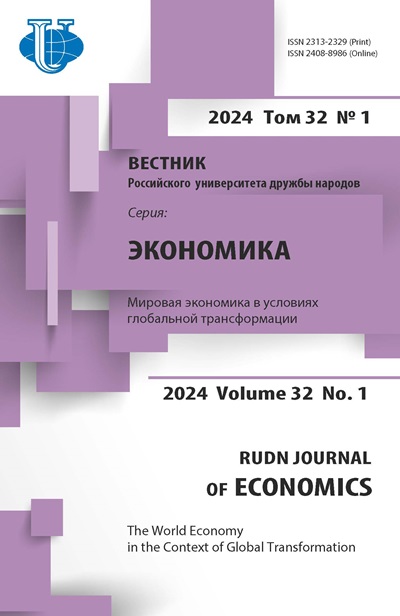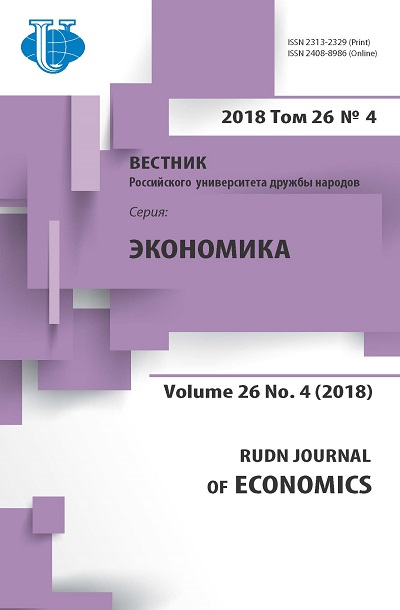Selected problems and roles of innovation development in the Slovak Republic
- Authors: Gonda V.1
-
Affiliations:
- University of Economics in Bratislava
- Issue: Vol 26, No 4 (2018)
- Pages: 662-673
- Section: REGIONAL ECONOMY
- URL: https://journals.rudn.ru/economics/article/view/20759
- DOI: https://doi.org/10.22363/2313-2329-2018-26-4-662-673
Cite item
Full Text
Abstract
In the current conditions of globalization, the importance of innovation is growing. Innovation is a key to sustainable growth, a tool to increase the competitiveness of companies, regions, states and integration groups, a means to address societal challenges. The European Union pays great attention to innovation efforts - f.e. through the group-wide strategies of competitiveness such as the Lisbon strategy and the Europe 2020 strategy. The aim of the paper is to evaluate the fulfillment of the Europe 2020 national goals for Slovakia in the field of smart growth, to analyze selected issues of innovative development in Slovakia and to propose possible measures for its improvement. As the subject matter is extremely complex and multitangular, the paper discusses only selected issues and questions.
About the authors
Vladimir Gonda
University of Economics in Bratislava
Author for correspondence.
Email: vladimir.gonda@euba.sk
Doctor of Economics (PhD), Professor, Department of Economics, Faculty of National Economy, University of Economics in Bratislava, Slovak Republic
1 Dolnozemská cesta, Bratislava, 852 35, Slovak RepublicReferences
- Gonda V. (2014). Innovatsionnyi soyuz — klyuchevaya innitsiativa strategii “Evropa 2020” (Innovation Union — Key Initiative of the Europe 2020 strategy). Modernizatsiya i innovatsionnoe razvitie ekonomicheskikh sistem. Kollektivnaya monografiya. Moscow: RUDN Publ. Pp. 106—118. (in Russ.)
- Brzica D., Kačírková M., Vokoun J. (2017). Vytváranie a zhodnocovanie potenciálu znalostnej spoločnosti. Bratislava: EÚ SAV.
- Európska komisia. (3. marec 2010). Európa 2020. Stratégia na zabezpečenie inteligentného, udržateľného a inkluzívneho rastu. Brusel. https://eur-lex.europa.eu/LexUriServ/LexUriServ.do?uri = COM %3A2010 %3A2020 %3AFIN %3ASK %3APDF
- Jeck T. (2010). Transfer a difúzia znalostí ako faktor modernizácie slovenskej ekonomiky: dizertačná práca. Ekonomický ústav SAV. 142 s.
- Klas A. (2010). Výskum ako faktor inovačného rozvoja. Ekonomický časopis [Journal of Economics]. No. 9 (58). Pp. 871—887.
- Ministry of Finance of the Slovak Republic. (Apríl , 2011). Národný program reforiem Slovenskej republiky 2011—2014. Bratislava. 48 p.
- Morvay K. et. al. (2017). Hospodársky vývoj Slovenska v roku 2016 a výhľad do roku 2018. Bratislava: EÚ SAV.
- Poznatkami k prosperite — Stratégia výskumu a inovácií pre inteligentnú špecializáciu Slovenskej republiky (RIS3 SK). (2013). http://www.economy.gov.sk/uploads/files/y8MaYzfF.pdf
- Šikula M. (ed.) (2013). Krízová a pokrízová adaptácia. Nové výzvy pre ekonomickú vedu. Zborník príspevkov z medzinárodnej vedeckej konferencie. Smolenice, 4—5. septembra 2013. Bratislava: EÚ SAV.















